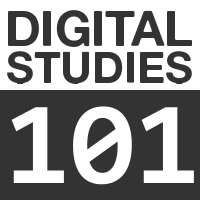The following courses offered during the Fall 2014 semester meet requirements of the Minor in Digital Studies.
Digital Studies
DGST 101: Introduction to Digital Studies |
Zach Whalen; 10:00 – 10:50 MWF; ITCC 327Introduces an interdisciplinary approach to using technology and specifically provides a foundation for the Minor in Digital Studies. |
Art and Art History
ARTS 104: Digital Approaches to Fine Art |
Section 1, 10:30 TR; Section 2, 3:30 TRThis course introduces basic tools and techniques of computer generated art in the context of studio theory and practice. |
ARTS 341: Multiple Imaging |
Rosemary Jesionowsky; 1:00 – 3:50 MWRequires ARTS 224 or 241Course expands upon skill and techniques learned in Photography I and Printmaking I, focusing on the idea of creating images in small editions. A variety of photographic, printmaking, and digital media techniques are explored. |
Communication
COMM 353: Visual Rhetoric |
P. Anand Rao; 11:00 – 12:15 TR; Combs 112Study of the rhetorical use of visual texts with an emphasis on the development and use of visual arguments. |
Computer Science
CPSC 106: Digital Storytelling |
A. Dean; 5:00 – 7:45 PM Mondays; Trinkle B6Two online sectionsPeople have been telling stories since the beginning of time., but how is story telling evolving in the digital age? This course explores how computers are being used to tell stories. We’ll study text-based technologies-blogging, the web- and how those models have changed the way we publish and disseminate narratives. Well also study the roles of audio, video, and images in narrative: computer animation, the ethics of altering digital images, and the Story Corps project. Students will use technology including blogs, virtual worlds, and computer games to create and tell their own stories. |
English
ENGL 245: Intro to Cinema Studies |
Antonio Barrenechea; 6:00 – 7:15 PM TR; Combs 139Equips students to analyze and understand the art of film. Emphasizes narrative film (the dominant mode of filmmaking) within the Anglophone tradition (the dominant cultural producer of film). |
ENGL 251Y: Adaptation |
Zach Whalen; 1:00 – 1:50 and 2:00 – 2:50 MWF; Combs 004This general education literature course considers the question of “adaptation” as an aspect of literary texts that are in some state of media transition; from book to film, from film to videogame, from novel to graphic novel, we are prone to taking for granted the very strange idea that the character we read in a book is somehow the same entity as the one we see portrayed on screen. |
ENGL 314: Literary Journal |
Elizabeth Wade; 1:00 – 1:50 MWF; Combs 349Requires ENGL 302A study of the contemporary national literary journal. Students also design and produce an on-line journal. |
ENGL 386: Graphic Novel |
Zach Whalen; 3:30 TR; Combs 322In this class, we’re going to study visual storytelling: the combination of images and text. While the graphic novel will be the primary genre under consideration, other specific forms (comics, comic strips, webcomics, etc.) will be examined as well. |
Historic Preservation
HISP 303A: Archives and Society |
6:00 – 7:15 TR; SIMP 225Examination of the theory and practice of archival work, including the preservation, organization, and cataloging of manuscript collections. |
History
HIST 471D7: History of the Information Age |
Jeff McClurken; 11:00 – 12:15 TR; ITCC 327 |






